Actualités
2011 - Weimar
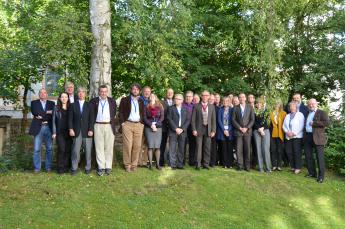
By Barbara van Benthem
It was a long trip for some of us in which all imaginable kinds of transportation were involved (except spacecraft), but it was worth travelling. From 27th September to 1st October the Presidents of ILAB’s 22 member associations met in Weimar in the east of Germany.
The German Antiquarian Booksellers’ Association and its President Eberhard Köstler had invited the ILAB Committee and the Presidents for their annual meeting to one of Germany’s oldest and most beautiful cities. Weimar was the centre of the German Classical period, where Goethe, Schiller and Herder lived and worked during the 18th and early 19th century. Franz Liszt and Henry van de Velde came to Weimar a few decades later, and Friedrich Nietzsche spent his last years there before he died in 1900. The Bauhaus was founded in Weimar by Walter Gropius in 1919, and in the same year the first German democratic constitution, the Weimar Republic, was brought to existence. It was only 18 years later that the Nazi regime established one of many concentration camps in Buchenwald, only 10 kilometres away from Weimar, and with it one of the most shameful and darkest periods of German history. In Germany there is hardly a town where so much history in all its facets can be found at such a small but lovely place as in Weimar.
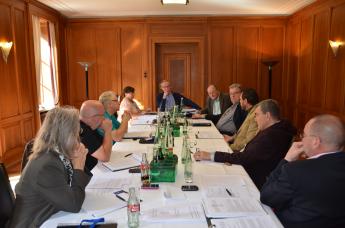
The location was splendid. The Hotel Elephant was established in 1696. Although we were not the most illustrious guests within the past 300 years, the service was perfect and we really felt at home. Johann Sebastian Bach, Leo Tolstoy and Thomas Mann had lodged there many years before the ILAB delegates. The German Association even organized magnificent weather! It was the first time in 2011 that the sun was shining brightly in Germany for four full days, without rain, snow, hail or thunderstorms. We held the Book Fair Workshop in the hotel garden, and we were able to have a glass of wine after work on the beautiful market place. After the Presidents’ Meeting in Potsdam 2003, the VDA has once more proved to be a brilliant organizer and the kindest host. And so we have to say once again: Thank you very much for giving ILAB the opportunity of four fabulous days of hard work, creative discussions, accompanied by lots of learning about books,history, German arts, politics, music, literature - and Goethe.
Thursday was reserved for the ILAB Committee Meeting. Guided by ILAB President Arnoud Gerits the Committee took a critical review of last year’s work and discussed future projects. In the evening the Presidents were welcomed with a dinner in the Elephantenkeller (in the Hotel Basement), with traditional Saxon food, Köstritzer Schwarzbier, Saale Unstrut wine, and a remarkable welcome speech by VDA President Eberhard Köstler whose good humour and French language skills cannot be praised highly enough.
Friday morning, 9 am: the Presidents and their spouses gathered for a historical walk through Weimar. We were led to all the houses of Weimar’s geniuses, as well as the St. Peter and Paul Church with its magnificent triptych by Lucas Cranach the Older. Johann Sebastian Bach was cantor at St. Peter and Paul, Johann Gottfried Herder is buried there, while only a few steps away Johann Wolfgang von Goethe and Christiane Vulpius were married in the St. Jacob Church in October 1806. We walked along the Liszt House and the Schiller House to the famous Frauenplan 1, which is the final destination of every Weimar pilgrimage. Goethe had lived there since 1782, and while his future wife Christiane managed the household unseen in the background, her husband Goethe became “Geheimer Legationsrat”, scholar and poet. His house, filled with contemporary copies of monumental Roman sculptures, was one of the cultural centres in the 18th century for poets, artists and politicians from all over Europe. We were not invited for tea by the great German poet, but we were allowed to walk through all his rooms and admire his artefacts, his desk, his bedroom, the kitchen and the garden. We were told almost everything about Goethe’s life, his career and affairs. It was an exciting and an exhausting trip through history.
After lunch we followed the traces of young Goethe to the River Ilm, the beautiful park and his Summer House. All of us? No. A small group visited another gem of German history: the Bauhaus Museum with its fine collection of drawings, photographs, chairs, tables, tea pots, glasses, ashtrays, lamps and children’s toys designed by Walter Gropius, Marcel Breuer, Marianne Brandt, Lyonel Feininger, Paul Klee and other Bauhaus artists.
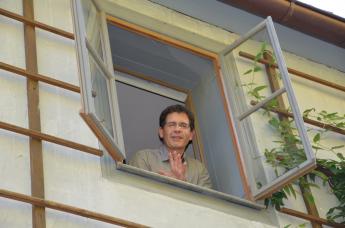
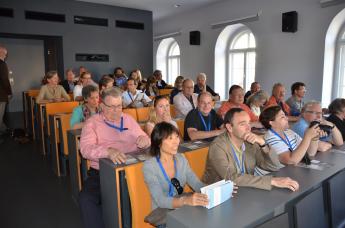
Highlight of the day was a lecture at the Duchess Anna Amalia Library. Founded as early as 1522 it houses literary treasures from the 9th to the 21st centuries including the collections of Goethe, Wieland, Herder, Nietzsche, Liszt, Büchner and Schiller. The famous Rococo Hall with its impressive collection of medieval manuscripts, incunabula and early German printings was destroyed by fire in 2004. The third floor and the attic were completely damaged, and with it around 62.000 books and manuscripts. Dr. Johannes Mangei of the Anna Amalia Library and the chief restaurator Ms Ripplinger described the difficult process of restoring the damaged books and showed many examples of nearly restored books and totally destroyed “ash books” which will be replaced by other copies within the upcoming years.
The incredible loss is documented in an online database which can be browsed by librarians and antiquarian booksellers. An exhibition “Journey into the World of Books” presented some of the most valuable objects of the Anna Amalia Library: from hand-coloured incunables and the Luther Bible to Nietzsche’s Ecce Homo illustrated with golden ornaments by Henry van de Velde. Finally we had the honour of visiting the Rococo Hall. The Hall has now been rebuilt, but due to its fragile architecture no more than 20 visitors are allowed to be in the room at the same time. It was a moving moment to walk through the Hall and to imagine how the fire had destroyed the building and all the books, how Weimar’s inhabitants helped all night in 2004 to rescue as many books as possible and how the library director Dr. Michael Knoche climbed up to the 2nd floor to rescue Martin Luther’s Bible translation in its first and very rare edition from the year 1534.
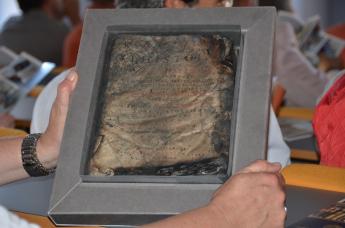
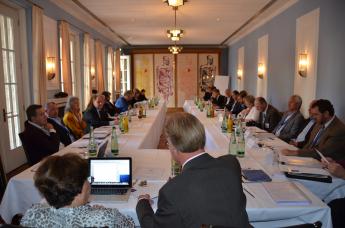
Back to work on Saturday. At 10 am ILAB President Arnoud Gerits welcomed the Presidents of the American, British, French, German, Dutch, Canadian, Austrian, Danish, Australian, Belgian, Hungarian, Japanese, Spanish, Italian and Swiss Associations as well as Alena Lavrenova from Russia, and VDA Vice-President Christian Hesse, who attended the Presidents’ Meeting as observers. The Presidents are the highest authority of ILAB, and as the League’s governing body nothing can be decided or finally done without their agreement. The Presidents’ decisions keep ILAB alive, they control the activities of the Committee and determine the direction which it will take within the next 12 months. The Presidents’ Meeting provides an opportunity to discuss things of mutual interest, to share concerns and to take initiatives. That’s why the agenda is always long and the very much deserved.
We heard the Presidents’ report about last year’s activities and what had been done behind the scenes, then the report of ILAB’s long-time treasurer Poul Poulsen, another report about the ILAB Website and the Stolen Books Database, their statistics and future perspectives. The new SLAM website was presented as a good example of cooperation between ILAB and the national associations in the Internet. N. Marsh’s announcement that the new ILAB Directory will be produced by herself was greeted with as much applause as Alain Moirandat’s notes concerning the next ILAB Congress and International Antiquarian Book Fair in Lucerne and Zurich in September 2012. He presented an exciting congress programme which will lead the delegates to Swiss libraries and spectacular private collections such as the Lucerne Central Library, the Rosengart Museum, the private library of Prof. Werner Oechslin and the Baroque monastery and library in Einsiedeln. Alain Nicolas gave an outlook on the ILAB Congress in 2014, which will be held in Paris on the occasion of the 100th anniversary of the Syndicat National de la Librairie Ancienne et Moderne (SLAM). Plans for a new ILAB publication were made: a book in which each national association provides a chapter on the specifics of bibliophily in its country. A great project! On behalf of Olga Tarakanova, Professor of the Antiquarian Book Trade Program in the Book Trade Department of the Moscow State University of Printing Arts, Norbert Donhofer reported about the efforts of the Russian Association (FAB) to build up better structures for rare bookselling in Russia. And he introduced Alena Lavrenova. She was one of the students from Moscow who participated in the first ILAB Internship Program which led her to antiquarian booksellers and auction houses in Hungary, Austria, Germany and the Netherlands. Many other items were discussed, like overseas memberships in national associations and the clear pricing of books at book fairs.
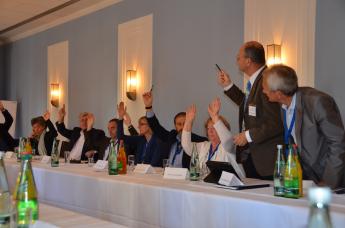
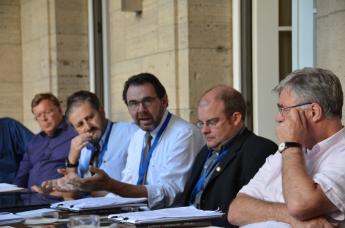
And as if this had not already been enough, a special workshop was held to discuss the rising problems international book fairs have to face. It was interesting to hear what the book fair organizers from Sydney to Paris to Tokyo and New York do to promote their fair and the antiquarian book trade in general. The workshop proved that it is inevitable to look beyond the own horizon from time to time to find new solutions to old problems, to see things from another perspective and to look for cooperation among colleagues worldwide. We all run our own businesses in all remote parts of the world, we are all highly individual, and we all try to earn our living with it. This would be impossible without the collegiality and cooperation the League as an umbrella organization is able to provide.
While the Presidents were at work their spouses visited the Weimar City Palace with the exhibition “Franz Liszt: A European in Weimar” and, in the afternoon, the Belvedere Palace
and Park.
And finally: the Farewell Dinner. It was a great and enjoyable evening, “A Slice of Heaven” presented with music from Vienna and poetry by … Goethe, performed by Ina Ullmann and Viola Michaelis, while the guests partook a most delicious dinner. The cook of the Anna Amalia Restaurant is a magician. He is even able to turn Parmigiano into ice cream - and you are doomed to like it, as we enjoyed everything in Weimar within those four days.
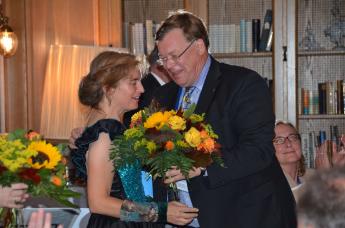
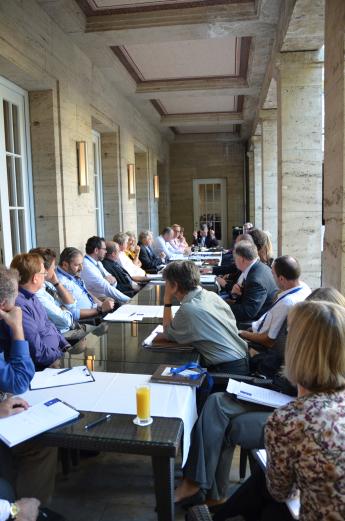
The report will be published in the next printed ILAB Newsletter which will be send to the affiliates mid October. More detailed information about the decisions taken at the Presidents’ Meeting are available - for ILAB affiliates only - in the internal part of the website where they can log in with their password.
More about the League
>>> History
>>> Congresses, Meetings, Fairs
